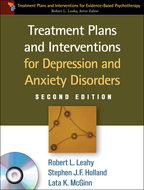Treatment Plans and Interventions for Depression and Anxiety Disorders
Second Edition
Robert L. Leahy, Stephen J. F. Holland, and Lata K. McGinn
Paperback + CD-ROMe-bookprint + e-book
Paperback + CD-ROM
orderOctober 26, 2011
ISBN 9781609186494
Price: $88.00490 Pages
Size: 8" x 10½"
Paperback + CD-ROM
Sign up for emails on upcoming titles by Robert L. Leahy (with special discounts)!
“The layout of each chapter, as well as the included sample treatment plans and patient forms, greatly facilitates the implementation of treatment within a busy practice.”

—Clinical Psychology Review
“Provides exactly what it suggestsa reference for clinicians about methods and practical interventions for a number of psychological disorders...This manual provides an excellent reference guide for any graduate student or therapist considering using CBT in a short-term treatment plan.”

—Behavioural and Cognitive Psychotherapy
“I highly recommend this book. For the novice, the authors provide a concise overview of the major risk factors and empirical approaches for each of the anxiety and mood disorders. For clinicians at every level of experience, the book is chock full of techniques, charts, and tools for implementing cognitive and behavioral strategies, with plenty of case examples to illustrate the techniques. The authors provide fantastic guidance on how to address common barriers in implementing cognitive-behavioral therapy.”

—Sheri L. Johnson, PhD, Department of Psychology, University of California, Berkeley
“Evidence-based interventions—especially cognitive and behavioral therapies—will occupy a central role in the future of mental health care. Written by highly experienced clinicians and scholars, this volume (together with the included CD-ROM) has filled a crucial need since its original publication. The second edition provides up-to-date, hands-on recommendations and concrete guidelines for treating the most common anxiety and mood disorders using well-supported cognitive and behavioral strategies. This is a 'must-read' book for mental health practitioners of the 21st century and an essential teaching tool for future therapists in all disciplines.”

—Stefan G. Hofmann, PhD, Department of Psychology, Boston University
“This updated second edition incorporates the latest theory and research. The authors present a wide array of tried and tested techniques and show when and how to use them. The book includes detailed guidance on assessment and report writing and abundant material for direct use with clients. It should be part of every clinician's CBT toolkit.”

—Adrian Wells, PhD, Division of Clinical Psychology, University of Manchester, United Kingdom
“This is a well-written, concise, yet scholarly and informative volume that will be of great value to psychotherapy trainees and practitioners. The most important current information on cognitive-behavioral techniques for depression and anxiety is clearly summarized. Available clinical tools are presented in a very practical and user-friendly manner.”

—James E. Mitchell, MD, The Lee A. Christoferson Chair in Neuroscience Research and Chester Fritz Distinguished University Professor, University of North Dakota School of Medicine and Health Sciences
“What an excellent resource! Comprehensive, concise, and easy to understand, the book offers a wonderful integration of theory, research, and clinical examples. A plethora of strategies and techniques are illustrated with session-by-session case studies. Essential reading for clinicians, this book should be a required text for any CBT course at the master's or doctoral level.”

—David Dia, PhD, LCSW, College of Social Work, University of Tennessee
—Clinical Psychology Review
“Provides exactly what it suggestsa reference for clinicians about methods and practical interventions for a number of psychological disorders...This manual provides an excellent reference guide for any graduate student or therapist considering using CBT in a short-term treatment plan.”
—Behavioural and Cognitive Psychotherapy
“I highly recommend this book. For the novice, the authors provide a concise overview of the major risk factors and empirical approaches for each of the anxiety and mood disorders. For clinicians at every level of experience, the book is chock full of techniques, charts, and tools for implementing cognitive and behavioral strategies, with plenty of case examples to illustrate the techniques. The authors provide fantastic guidance on how to address common barriers in implementing cognitive-behavioral therapy.”
—Sheri L. Johnson, PhD, Department of Psychology, University of California, Berkeley
“Evidence-based interventions—especially cognitive and behavioral therapies—will occupy a central role in the future of mental health care. Written by highly experienced clinicians and scholars, this volume (together with the included CD-ROM) has filled a crucial need since its original publication. The second edition provides up-to-date, hands-on recommendations and concrete guidelines for treating the most common anxiety and mood disorders using well-supported cognitive and behavioral strategies. This is a 'must-read' book for mental health practitioners of the 21st century and an essential teaching tool for future therapists in all disciplines.”
—Stefan G. Hofmann, PhD, Department of Psychology, Boston University
“This updated second edition incorporates the latest theory and research. The authors present a wide array of tried and tested techniques and show when and how to use them. The book includes detailed guidance on assessment and report writing and abundant material for direct use with clients. It should be part of every clinician's CBT toolkit.”
—Adrian Wells, PhD, Division of Clinical Psychology, University of Manchester, United Kingdom
“This is a well-written, concise, yet scholarly and informative volume that will be of great value to psychotherapy trainees and practitioners. The most important current information on cognitive-behavioral techniques for depression and anxiety is clearly summarized. Available clinical tools are presented in a very practical and user-friendly manner.”
—James E. Mitchell, MD, The Lee A. Christoferson Chair in Neuroscience Research and Chester Fritz Distinguished University Professor, University of North Dakota School of Medicine and Health Sciences
“What an excellent resource! Comprehensive, concise, and easy to understand, the book offers a wonderful integration of theory, research, and clinical examples. A plethora of strategies and techniques are illustrated with session-by-session case studies. Essential reading for clinicians, this book should be a required text for any CBT course at the master's or doctoral level.”
—David Dia, PhD, LCSW, College of Social Work, University of Tennessee



